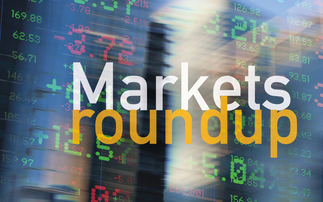
If you're like me, at this time of year your inbox fills up with outlooks for the year ahead. And invariably, a few weeks into the new year, something unforeseen happens which renders them out of date. With that in mind, rather than look ahead to next year, it might be more worthwhile to look ahead toward what might shape the next business cycle.
More capital, less savings
While a recession in the coming year isn't a certainty, we'll base our view covering the next one to three years on the possibility of one occurring. Coming out of the downturn, I expect there'll be a transition in which a lot more physical capital will be deployed than in the prior cycle. In the last business cycle, the focus was on intangible capital. Think companies with lots of intellectual property but not a lot of tangibles. In the coming cycle, I'd expect spending on things such as green technologies to take the place of dirty energy. Money will be spent to make supply chains more resilient and to facilitate the move to just-in-case inventories from decades of just-in-time ones. I also expect far more money to be spent on the military. All this will require much more physical capital than was necessary in the prior cycle.
Not only will more capital be required, but it will also be more expensive. We need to think about what the savings rate will look like in this new environment. I think the run rate of savings will still be positive, but it will be slower than the previous cycle — if not the last several business cycles.
Higher inflation, more growth
In my view, if the call on physical capital is rising at a faster rate at the same time the pace of the rise in the savings rate is falling — still positive but falling — it seems to me that that rhymes with higher inflation and higher interest rates. But I think the capital itself will translate into a slightly higher real gross domestic product (GDP) growth level.
On the other hand…
One caveat to this view is that we've built up a tremendous amount of public sector debt. When combined with higher interest rates, that means we'll have to spend more to service that debt, which theoretically could crowd out private capital. But in practice, I'm not sure it will work out that way. Other things would probably need to happen.
An awful lot will depend on whether the banking system is willing to lend capital. And since banks are in relatively good shape, they should be in a good position to lend on the other side of the expected downturn, whether we fall into recession or not. Even if the government has to spend more on interest, I think we'll see capital getting out into the economy.
Labour's day?
On the labour front, there are lots of moving parts. What's our immigration policy? How much scarcity is there? Is labor going to take a larger slice of the pie? With corporate America in the political crosshairs of both major parties, their bottom lines may suffer as a result of higher wage bills and greater regulatory oversight. If that plays out, the next cycle could be extended thanks to labor's strength, but corporate profit margins could suffer a bit.
Spending more to stand still
I think in the next business cycle you're going to see companies that are forced to spend more on capital to stand still. For instance, spending to alleviate environmental, social, and governance (ESG) concerns or due to higher wages. And that's not good for productivity. Nor is it good for the corporate bottom line. However, it could be good for economic growth since you'll need to spend more capital, and capital is going to need more labour. So, it might be one of these moments when the economy looks better than what you would expect based purely on looking at the path of asset valuations. In some ways, it could be the mirror image of the post-global financial crisis (GFC) cycle where, this time, Main Street is the relative winner, not Wall Street.
Loose monetary and fiscal combo a thing of the past
The combination of relatively loose monetary policy and quite loose fiscal policy over the past decade will be very difficult to replicate going forward. At some point, markets will grow concerned over both high levels of public and private sector debt. Not only do we have a higher ratio of debt to GDP, but growth rates and population growth are slowing. That's all the more debt piled onto the backs of a labour force that's growing more slowly.
One way to think about this is how much debt is on the back of each hour worked by the labour force. It's increasing rapidly. At some point, that's going to break down, and there are two ways to address that. One is austerity. Good luck getting fiscal austerity in this political environment. The other way is through inflation. That's a magic cure-all for fiscal policymakers, but it's dreaded by workers.
Where do we come out on the other side of a downturn?
In the last business cycle, we averaged about 2% growth. I think we're looking at something a little bit higher in the next cycle, but that's probably a 2024/2025 story. On inflation, I think we'll average something closer to 2.75% (which is what it averaged during the 1990s and 2000s expansions), up from the 1.75% average of the post-GFC cycle. During that cycle, investors paid a premium the further they went out the curve to own Treasuries. In other words, a negative term premium. I think that's likely to reverse in the future, so, coming out of what we expect to be a recession, interest rates will be notably higher than in the last business cycle.
That environment could be especially challenging for companies that relied on really low interest rates but one that solid companies should have little problem acclimating themselves to. My guess is that in the next cycle we'll be looking at mid-single-digit returns for both stocks and bonds. And that's not too bad.
The views expressed are those of the author(s) and are subject to change at any time. These views are for informational purposes only and should not be relied upon as a recommendation to purchase any security or as a solicitation or investment advice. No forecasts can be guaranteed.
Unless otherwise indicated, logos and product and service names are trademarks of MFS® and its affiliates and may be registered in certain countries.
Distributed by: U.S. - MFS Investment Management; Latin America - MFS International Ltd.; Canada - MFS Investment Management Canada Limited. No securities commission or similar regulatory authority in Canada has reviewed this communication.
Please note that in Europe and Asia Pacific, this document is intended for distribution to investment professionals and institutional clients only.
Note to UK and Switzerland readers: Issued in the UK and Switzerland by MFS International (U.K.) Limited ("MIL UK"), a private limited company registered in England and Wales with the company number 03062718, and authorised and regulated in the conduct of investment business by the UK Financial Conduct Authority. MIL UK, an indirect subsidiary of MFS®, has its registered office at One Carter Lane, London, EC4V 5ER. Note to Europe (ex UK and Switzerland) readers: Issued in Europe by MFS Investment Management (Lux) S.à r.l. (MFS Lux) - authorized under Luxembourg law as a management company for Funds domiciled in Luxembourg and which both provide products and investment services to institutional investors and is registered office is at S.a r.l. 4 Rue Albert Borschette, Luxembourg L-1246. Tel: 352 2826 12800. This material shall not be circulated or distributed to any person other than to professional investors (as permitted by local regulations) and should not be relied upon or distributed to persons where such reliance or distribution would be contrary to local regulation; Singapore -
MFS International Singapore Pte. Ltd. (CRN 201228809M); Australia/New Zealand - MFS International Australia Pty Ltd (" MFS Australia") holds an Australian financial services licence number 485343. MFS Australia is regulated by the Australian Securities and Investments Commission.; Hong Kong - MFS International (Hong Kong) Limited ("MIL HK"), a private limited company licensed and regulated by the Hong Kong Securities and Futures Commission (the "SFC"). MIL HK is approved to engage in dealing in securities and asset management regulated activities
and may provide certain investment services to "professional investors" as defined in the Securities and Futures Ordinance ("SFO").; For Professional Investors in China - MFS Financial Management Consulting (Shanghai) Co., Ltd. 2801-12, 28th Floor, 100 Century Avenue, Shanghai World Financial Center, Shanghai Pilot Free Trade Zone, 200120, China, a Chinese limited liability company registered to provide financial management consulting services.; Japan - MFS Investment Management K.K., is registered as a Financial Instruments Business Operator, Kanto Local Finance Bureau (FIBO) No.312, a member of the Investment Trust Association, Japan and the Japan Investment Advisers Association. As fees to be borne by investors vary depending upon circumstances such as products, services, investment period and market conditions, the total amount nor the calculation methods cannot be disclosed in advance. All investments involve risks, including market fluctuation and investors may lose the principal amount invested. Investors should obtain and read the prospectus and/or document set forth in Article 37-3 of Financial Instruments and Exchange Act carefully before making the investments.












